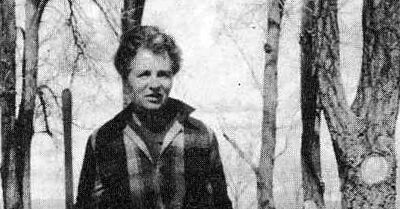Long before Nebraska Poet Laureate John G. Neihardt was a respected old man known for television appearances and his book Black Elk Speaks, he was a cocky young man trying to find his place in the world. He worked at a number of occupations in his youth, including those of publisher and editor of the Bancroft Blade. He enjoyed writing editorials but lacked interest in other aspects of the work. His resignation appeared in the Blade on January 20, 1905:
“Notice — I herewith tender my resignation to the Blade Publishing Co. as editor and manager of the Blade, such resignation to take effect February 1st.
“In doing this, it is perhaps not entirely unnecessary that I should explain briefly, both in fairness to my friends, who compose the company, and for the information of the public, . . .
“Briefly stated, I was not fashioned for the pleasant and flowery path of a country editor. I can not bring myself to place an epochal significance upon the fact that Miss Somebody ‘went to the next town Saturday,’ or that Willie Brightboy ‘has been very ill with the mumps.’ I concede that this peculiarity amounts to incapacity.
“Furthermore, the thoughts that please me are far other than the thoughts of most of those who read the country papers. Those things which carry a deep significance for me are not only inessential, but odious to the subscriber, and he is decidedly in the majority; . . . .
“None can serve two masters; and I have been guilty of a futile endeavor to disprove this wise old maxim by obeying two at once: one with tireless enthusiasm and the other with a jaded spirit. Perhaps time can explain this anomaly better than I.”
One can almost about hear readers grumbling about the 24-year-old former editor who demanded subjects of “epochal significance” but who couldn’t sustain interest in news of local interest, or appreciate how vital such news is in sustaining a community. But maybe they gave him credit for honesty. He knew he was in the wrong line of work and said so.
Two years later, book critics praised Neihardt’s A Bundle of Myrrh, a book of love poems that Neihardt later acknowledged were “rather frank for the time.” Several years later he turned to writing epic poetry about the history of the American West—and felt that at last he had found his true calling.



